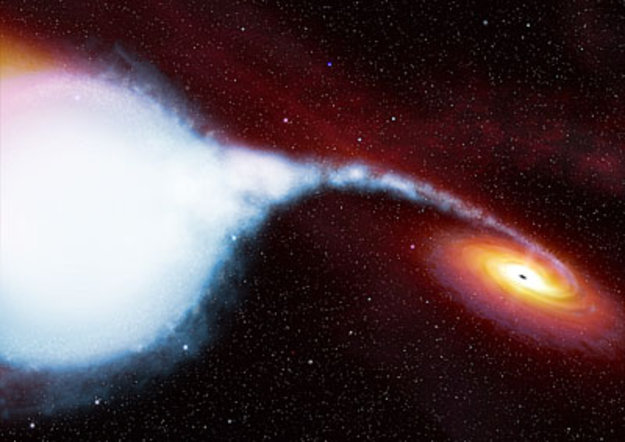Forbes | Starts With A Bang | 2017 Aug 09
[img3="This illustration of a black hole, surrounded by X-ray emitting gas, showcases one of the major ways black holes are identified and found. Based on recent research, there may be as many as 100 million black holes in the Milky Way galaxy alone. Credit: ESA"]https://blogs-images.forbes.com/startsw ... KN7I_A.jpg[/img3][hr][/hr]How many black holes are there in the Milky Way? This straightforward question has proven extremely difficult to answer, since black holes are so difficult to directly detect. However, scientists not only have developed indirect methods for locating and even weighing them, we also understand how the Universe forms them: from stars and stellar remnants. If we can understand the different stars that existed at all different times in our galaxy's history, we should be able to infer exactly how many black holes — and of what mass — exist in our galaxy today. Thanks to a comprehensive study by a trio of researchers from UC Irvine, the first accurate estimates of the number of black holes found in Milky Way-like galaxy have now been made. Not only is our galaxy filled with hundreds of billions of stars, but we also are home to up to 100 million black holes.
This is all the more remarkable when you consider that it wasn't so long ago — back in the 1980s — that scientists weren't yet certain that black holes existed. The best evidence we had came from X-ray and radio emitting sources that exerted a gravitational influence that exceeded that of neutron stars, and yet had no optical or infrared counterpart. Subsequently, we began measuring the motions of stars at the galactic center using multiwavelength astronomy, revealing that they appeared to orbit a large mass that needed to contain about four million Suns' worth of matter. Consistent with other observations of more active galaxies, we now believe that every massive galaxy, including our own, contains a supermassive black hole. ...
UCI Celestial Census Indicates that Black Holes Pervade the Universe
University of California, Irvine | 2017 Aug 07
Researchers expect more gravitational-wave evidence of collisions in the near future
After conducting a cosmic inventory of sorts to calculate and categorize stellar-remnant black holes, astronomers from the University of California, Irvine have concluded that there are probably tens of millions of the enigmatic, dark objects in the Milky Way – far more than expected. ...
Counting Black Holes: The Cosmic Stellar Remnant Population
and Implications for LIGO - Oliver D. Elbert, James S. Bullock, Manoj Kaplinghat
- Monthly Notices of the RAS (online 02 Aug 2017) DOI: 10.1093/mnras/stx1959
arXiv.org > astro-ph > arXiv:1703.02551 > 07 Mar 2017
